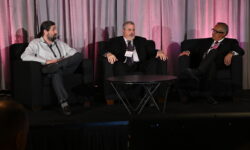Integrator Roundtable: Execs Say Diversification, Cloud and Managed Services Loom Large
Like allied forces generals plotting moves following victory in a tide-turning battle, a trio of security integration company leaders compare notes for post-pandemic success.

(Image Credit: ra2 studio/stock.adobe.com)
Continuing with managed and Cloud-based services, have you found it challenging to develop a pricing model?
Bongard: Yes, we’re continually looking at that. We run it separately. We have our install salespeople and we have our service salespeople, and we’re running it more through our service department. It is a different type of compensation and it’s to keep people involved and interested. We don’t we have it completely figured out yet, but we have a pretty decent platform. A good thing about it is that you can talk to your customer and they can budget for it easier. You can tell them, “This what it’s going to cost you over this timeframe” and it becomes more palatable for them on the RMR model that way.
Boulgarides: When we put together the pro-gram, the first thing I did was bring on a director of managed services to manage the program. Our salespeople and other people in the company, when they get a managed services opportunity, they’re able to work with somebody who guides the process. Whale hunters didn’t have to turn into managed services sellers, they just had to identify the opportunities. Our gross margin for managed services is 50%. Installed systems sell for somewhere around 32% gross margin, so managed is much more profitable. The objections around Cloud are rapidly going away, so we’re not dealing with that much. It is extremely profitable and beneficial for our company.
From an incentivizing standpoint, I make things really simple as I don’t want my salespeople to have to think too much. They get two times the monthly recurring revenue upfront of anything they sell. If you sell a $1,000 RMR contract, the first time we get paid you get a check for $2,000. It’s 10% of our revenue right now, with our goal being 20%.
Francisco: I love Louis’ compensation idea and actually wrote it down! RMR is very important to us and we currently have a sizable chunk. However, we would like to increase managed services. A lot of it for us comes down to a learning shift and training people for it. Also, you don’t want your big game hunters to focus attention on RMR as they’re going to get bored with it. It’s just a mind shift for us to try to get toward that.
What are some positives to come out of the pandemic experience in terms of operational efficiencies or best practices that will continue to benefit your organization moving forward?
Francisco: Prior to the pandemic, we had already been engaging with and doing a lot more remote work. We were on Office 365 with Microsoft Teams, we had the Zooms, we had to Go to Meetings. We had already had our virtual machines and everything in the Cloud. However, we had a plan that had to be sped up and we discovered some things that we were missing when going remote.
Instead of doing a pilot program we went straight into production. We had to make it work. Everybody on our team rolled up their sleeves and fully adopted and engaged with the tools we have. They showed initiative to learn and figure things out. We still have some internal software that can’t be in the Cloud yet so we had to find ways to manage that. We continue to have this innovative spirit and right now our new thing is monday.com. It’s a Kanban-type project management tool for multiple projects and my guys love it. We use it to track 50 current, ongoing projects. Another bright side of things has been the strong comradery among our staff. We were blessed to have such an amazing team that we probably wouldn’t have realized unless we were all in it together. I guess trauma builds that cohesiveness, that we survived it together.
Bongard: We’ve learned that more than any-thing, how resilient we are. You always hope you would be, you always think you would be, but you don’t know until times of trouble. Traditionally, we have no one working from home but during the pandemic we had 80%. We learned that during times of pressure you can create some very good initiatives. As mentioned before, we were already going through our business continuity plans and were prepared. The other thing was we were really proactive in meeting about what was happening overseas before it really hit even the U.S. We also learned that technology truly is the backbone of everything we do and utilized it more than ever. Virtually officing and virtual communication has become almost the norm. We learned we can do this remote. We learned we can get through it. But it still doesn’t take the place of face-to-face and in-person touches.
In long term, has virtualization changed to some extent the way you may do some sales presentations or hiring practices?
Bongard: Absolutely, especially some initial interviews. We had many virtual lunch-and-learns. We held some mini-conferences with our customers. It was tough at first to keep people engaged. We had to shift gears to make it more interactive and interesting. I think we all learned as an industry how to get through that and make it better going forward.
Perhaps some of the skills gained from that will add efficiencies down the line?
Bongard: Yes, especially training. Traditionally, we all had to send people off to a different state or somewhere else. You’re incurring costs and salaries or wages of some kind, per diem out of the office and hotel. During the pandemic, a lot of it was offered virtually and it was fantastic. I’m looking forward to more of that. It’s just more efficient for companies and for who’s offering as well.
Boulgarides: We were already a virtual company so that part of it was not a big deal, but I never thought I had to have 1,000 masks or cases of hand sanitizer in my warehouse. I do now in case something like this ever happens again. When this thing hit, we had nothing. I was going down to the garment district in downtown L.A. and having them make us masks. This whole process, overall, as a company we’re now better prepared if this happens again. This may be the new normal as this moves forward. We were fortunate as a company in that although we had some cases of COVID everyone did a good job following the guidelines to minimize spread.
The experience reinforced our business strategy to diversify as you don’t want to have all your eggs in one basket. Thank God I didn’t have all my eggs in the office space basket or else I wouldn’t be doing this interview right now. Managed services is really important, and we need to redouble our efforts there. It was one of the reasons we were able to get through this. It wasn’t enough to cruise through, but it helped a lot. A lot of things we were doing were reinforced as being on the right track; it was a wake-up call to double down on those things. It added a sense of urgency because there were a few gut checks along the way.
If you enjoyed this article and want to receive more valuable industry content like this, click here to sign up for our FREE digital newsletters!

Security Is Our Business, Too
For professionals who recommend, buy and install all types of electronic security equipment, a free subscription to Commercial Integrator + Security Sales & Integration is like having a consultant on call. You’ll find an ideal balance of technology and business coverage, with installation tips and techniques for products and updates on how to add to your bottom line.
A FREE subscription to the top resource for security and integration industry will prove to be invaluable.








